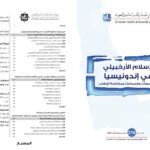If you live along the northern coast of Java, specifically in Kajen Village, Margoyoso District, Pati Regency, the name KH. Abdullah Zain Salam, affectionately known as Mbah Dullah, would surely be familiar. He was a charismatic cleric, renowned during his lifetime for his simplicity, generosity, and deep humility. His presence was not only a beacon of religious guidance but also a model of leadership and community service.
Mbah Dullah was widely respected not merely for his profound knowledge of Islamic teachings but also for his exemplary character. Despite holding a prominent position among scholars and being revered by thousands, he lived a remarkably simple life. His modest home and unassuming lifestyle reflected his principle of zuhud—detachment from worldly excesses—and underscored the importance of living modestly and sincerely.
In his role as a community leader, Mbah Dullah consistently prioritized the principle of musyawarah (deliberation). He never made decisions unilaterally but preferred to engage in consultation and seek collective agreement. This approach highlighted his deep respect for others and the importance he placed on communal harmony. Consultation and consensus became the foundation of every decision he made, whether in social matters, religious affairs, or issues affecting the broader community.
When it came to fiqh (Islamic jurisprudence), Mbah Dullah was particularly cautious. Despite his extensive knowledge, he always sought the input of fellow scholars when making important decisions. One of his closest collaborators was his nephew, KH. MA. Sahal Mahfudh, a distinguished scholar who later became the Rais ‘Aam of Nahdlatul Ulama and a prominent authority in contemporary Islamic jurisprudence. Mbah Dullah humbly consulted KH. Sahal to ensure that every decision was deeply rooted in scholarly analysis and sound judgment.
Similarly, regarding matters of falak (Islamic astronomy), especially the determination of the beginning of the Hijri months, Mbah Dullah refrained from making personal judgments. Instead, he consistently sought the expertise of KH. Ahmad Fayumi Munji, a highly respected expert in the field. The determination of lunar months—such as the start of Ramadan or Eid al-Fitr—is a significant issue with wide social and religious implications. Thus, Mbah Dullah’s meticulous and collaborative approach reflected his integrity and sense of responsibility as a leader.
Mbah Dullah’s humility was evident in every aspect of his leadership. Despite his strong moral and social authority, he never imposed his will on others. He did not see himself as superior or entitled to dominate decision-making simply because of his knowledge or status. Rather, he demonstrated that true leadership lies in embracing others, actively listening, and valuing diverse opinions. His humble demeanor earned him deep love and respect not only among his students but also among the broader community from various backgrounds.
Mbah Dullah’s greatness never manifested in authoritarian control. Instead, he taught that a leader’s strength is measured by their ability to exercise restraint, foster dialogue, and prioritize consultation. Through this principle, the decisions he made always brought about communal benefit, preserved unity, and strengthened ukhuwah Islamiyah (Islamic brotherhood) among the people.
From Mbah Dullah’s example, we learn that humility and leadership based on consultation are essential keys to building a harmonious society. His character and actions offer a lasting legacy for anyone aspiring to lead with compassion, to build with love, and to nurture unity amidst diversity.
Contributor: Siswanto
Institut Pesantren Mathali’ul Falah, Pati, Jawa Tengah, Indonesia







